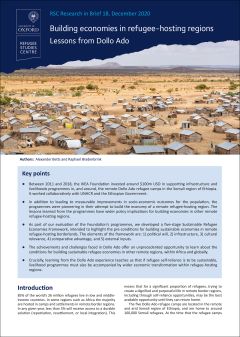Building economies in refugee-hosting regions: lessons from Dollo Ado
Alexander Betts , Raphael Bradenbrink

Between 2011 and 2018, the IKEA Foundation invested around $100m USD in supporting infrastructure and livelihoods programmes in, and around, the remote Dollo Ado refugee camps in the Somali region of Ethiopia. It worked collaboratively with UNHCR and the Ethiopian Government. Between June and December 2019, the RSC’s Refugee Economies Programme undertook a retrospective evaluation of the impact of the interventions. In addition to leading to measurable improvements in socio-economic outcomes for the population, the programmes were pioneering in their attempt to build the economy of a remote refugee-hosting region. The lessons learned from the programmes have wider policy implications for building economies in other remote refugee-hosting regions. As part of the evaluation of the Foundation’s programmes, we developed a five-stage Sustainable Refugee Economies Framework, intended to highlight the pre-conditions for building sustainable economies in remote refugee-hosting borderlands. The elements of the framework are: 1) political will, 2) infrastructure, 3) cultural relevance, 4) comparative advantage, and 5) external inputs. The achievements and challenges faced in Dollo Ado offer an unprecedented opportunity to learn about the conditions for building sustainable refugee economies in other remote regions, within Africa and globally. Crucially, learning from the Dollo Ado experience teaches us that if refugee self-reliance is to be sustainable, livelihood programmes must also be accompanied by wider economic transformation within refugee-hosting regions.
